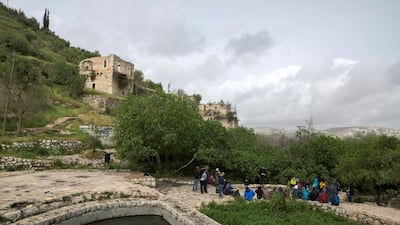For the first time in 75 years, the UN has officially commemorated the Nakba — the plight of hundreds of thousands of Palestinians who were forced to leave their homes upon the formation of Israel.
The UN passed a historic resolution in 2022, despite Israel's vehement opposition, to recognise the Nakba, which roughly translates as “catastrophe”.
The day brings painful memories of displacement and widely documented reports of torture and mass killings by Israeli forces against Palestinians in 1948.
On Monday, Palestinian President Mahmoud Abbas marked the occasion by calling on the UN to suspend Israel’s membership if it does not grant Palestinians a state and the right of return for millions of refugee descendants.
He demanded that Israel respect UN resolutions calling for a Palestinian state or else “suspend Israel's membership in the UN, particularly since Israel never fulfilled its obligations and the prerequisites for its membership in this organisation that they committed to implementing”.
The assembly also hosted a commemorative event, with live music and personal testimonies.
“This is an occasion to highlight the noble goals of justice and peace, require recognising the reality and history of the Palestinian people's plight and ensuring fulfilment of their inalienable rights,” the UN said.
In November, the 193-member General Assembly approved a resolution by a vote of 90-30 with 47 abstentions requesting that the UN Committee on the Exercise of the Inalienable Rights of the Palestinian People organise a high-level event on May 15 to commemorate the Nakba.
Washington instructed the US mission at the UN not to attend Monday’s event.
Israel’s ambassador to the UN, Gilad Erdan, criticised the body's decision to mark the “one-sided” commemoration, saying that it condones “Jew-hatred” and “gives a green light to the Palestinians to continue exploiting international organs to promote their libellous narrative”.
It was the General Assembly resolution of December 1947 that approved dividing Palestine, which allowed Israel to declare independence once the British mandate expired in 1948, leading to mass displacement.
“The Nakba is a defining moment of the Palestinian people's collective life, history and still ongoing dispossession: deprivation of space to commemorate it violates freedom of expression and is an intolerable act of condescendence and discrimination against them,” Franscesca Albanese, the UN special rapporteur for the occupied Palestinian territories, tweeted on Monday.
Cross-border attacks
Many Palestinians argue that the Nakba is still happening.
On the day of the anniversary, a Palestinian man was killed by Israeli forces in the West Bank during a raid on the city of Nablus, the Palestinian Health Authority said.
On Saturday, five days of cross-border attacks between Gaza and Israel were ended by an Egypt-mediated ceasefire. The violence killed more than 33 Palestinians in the Gaza Strip and two Israelis.
Mr Abbas accused the US and Britain of “remaining silent” in the face of ongoing aggression.
“Britain and the United States specifically bear political and ethical responsibility directly for the Nakba of the Palestinian people, because they took part in rendering our people a victim when they decided to establish and plant another entity in our historic homeland for their own colonial goals,” he said.
Last week, Palestinian Prime Minister Mohammad Shtayyeh urged the UN to “condemn the aggression and the ongoing killings of our people”.
Riyad Mansour, the Palestinian UN ambassador, told AP that Palestinians had moved cautiously at the UN since the assembly raised the status of Palestine from a non-member observer to a non-member observer state.
Rosemary DiCarlo, the UN's undersecretary general, said Palestinians deserve a life of justice and dignity and the “realisation of their right to self-determination and independence”.
Mr Abbas said Israel's acceptance as a UN member was contingent on its fulfilment of the 1947 UN Partition Plan and General Assembly Resolution 194, which called for refugees who were willing to live in peace to be allowed to return to their former homes following the war.
The Palestinian leader said that the UN has adopted “one thousand” resolutions since 1947 that recognise the rights of the Palestinian people, but “not one single resolution was implemented”.












